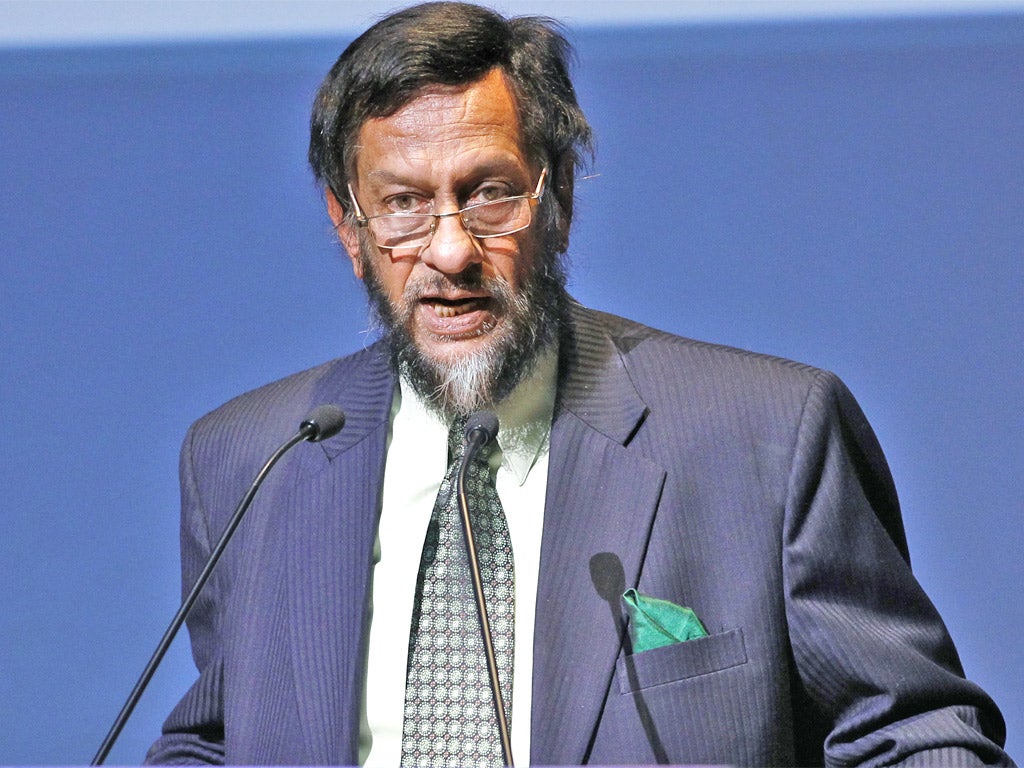Plan to use financial markets to halt climate change is ‘doomed’

A leading scientist has dismissed the United Nations’ call for governments to use the world’s financial markets as the central weapon against climate change as being “doomed to failure and a dangerous distraction”.
Rajenda Pachauri, the chairman of the UN Intergovernmental Panel on Climate Change (IPCC), said that the markets were humanity’s only hope to combat global warming as he unveiled the panel’s latest landmark report on Friday.
He urged policymakers to look at ways of using the markets to put a price on carbon emissions that was so high that producers and consumers would be forced to rely on much greener energy. “An extremely effective instrument is to put a price on carbon. It is only through the market that you can get a large enough and rapid enough response,” he said on Friday.
He was referring to the limiting of global warming to 2C, the temperature beyond which the consequences are predicted to become increasingly devastating. However, Kevin Anderson, professor of energy and climate change at the University of Manchester, criticised Dr Pachauri, saying his emphasis on the markets would be counter-productive, diverting attention away from more effective methods of tackling the problem.
He also argued that even climate scientists have failed to appreciate the true scale of the challenge the world faces in containing global warming.
“I disagree strongly with Dr Pachauri’s optimism about markets and prices delivering on the international community’s 2C commitments. I hold that such a market-based approach is doomed to failure and is a dangerous distraction from a comprehensive regulatory and standard-based framework,” he said.
“I get the impression that many scientists engaged in climate change seriously misunderstand the mitigation challenge,” added Professor Anderson, who is also deputy director of the Tyndall Centre for Climate Change.
He is in favour of a “standard-based” framework that would put a lid on the maximum amount of CO2 that could be produced in various activities. This could stipulate how much carbon an energy generator could emit in the production of a kWh of electricity or a car engine could produce per kilometre, Professor Anderson explained.

These limits would be reduced over time as technological innovation improved efficiency, he said. He argued that while a market-based approach can be effective when it comes to “small changes in the system”, the scale of the overhaul needed to drastically reduce emissions would require such a high carbon price that it would completely distort the market. This would push the price of goods and services up by so much that it would put them beyond the reach of large swathes of the global population while the wealthy could carry on more-or-less as normal, Professor Anderson argued.
Such price increases could also destroy the value of many companies producing high carbon emissions by making them less profitable.
The EU Emissions Trading Scheme (ETS) was launched in 2005 and is by far the most ambitious of the handful of carbon trading schemes that have been tried across the world, but it has been largely ineffective.
COMMENT: Difficult political actions are the only real solution
Tom Bawden
Although the prospect of letting the markets sort out climate change has raised plenty of eyebrows, most would argue that IPCC chairman Rajendra Pachauri’s recommendation was rooted in the real world. By contrast, the IPCC’s decision to include a short section on “geoengineering” for the first time in its climate change report was a surprise. The measures, which have the strong support of Russia, include such techniques as cooling the Earth by spraying sulphate aerosols into the stratosphere to reflect sunlight, or fertilising the oceans with iron to create carbon-capturing algal blooms.
The inclusion of geoengineering will help to legitimise the kind of solutions that many believe are both unfeasible and dangerous – the manipulation of sensitive planetary systems in one area could result in drastic, unintended consequences somewhere else, such as radically disrupted rainfall. These are the kind of arguments given against GM crops – but on a much bigger scale.
Geoengineering is seductive because it implies a magic wand that can wave your troubles away – a bit like taking a pill that sorts out your personal issues without having to go through hours of painful analysis. But the sheer scale of these projects and their technical ambition makes them seem pie-in-the-sky. Still, the fact the IPCC is taking geoengineering seriously shows just how desperate the need is to do something drastic to tackle greenhouse gas emissions.
Join our commenting forum
Join thought-provoking conversations, follow other Independent readers and see their replies
Comments
Bookmark popover
Removed from bookmarks